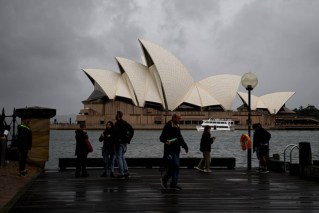insUkraine has agreed to attend negotiations with Moscow’s delegates on the Belarus border even as Belarus fired missiles and Russia’s President moved nuclear weapons defences to “special alert”.
Ukraine’s President Volodymyr Zelensky wrote on his official Telegram channel that his advisers would be sent to the border of Belarus and Ukraine.
Belarus’ president Alexander Lukashenko “has taken responsibility for ensuring that all planes, helicopters and missiles stationed on Belarusian territory remain on the ground during the Ukrainian delegation’s travel, talks and return,” Mr Zelensky wrote.
“I will say frankly that I do not really believe in the outcome of this meeting, but let them try to make sure that no citizen of Ukraine has any doubt that I, as a president, did not try to stop the war.”
Early Monday morning, a Ukrainian adviser posted footage of Russian-made 9K720 Iskander missiles being fired from Belarus into northern Ukraine.
“It means that death brought somewhere,”Anton Herashchenko wrote on Facebook, describing what he said was an attack on the Mozyryr district.
“Is this what a truce means?”
Ukrainian forces were holding off Russian troops advancing on the capital Kyiv, as the biggest assault on a European state since World War II entered a fourth day.
The New York Times reports that its analysis of footage and photographs from Ukraine shows Russian military is advancing on Kharkiv, the country’s second-largest city.
The videos showed Ukrainians firing rockets toward Russian troops, as well as some Russian military vehicles.
A natural gas pipeline was blown up before daybreak on Sunday, a Ukrainian state agency said.
Kharkiv’s governor said just before 4am Monday that Ukraine maintains control of the city.
“The armed forces, the police, and the defence forces are working and the city is being completely cleansed of the enemy,” Oleh Sinegubov wrote on Telegram.
Casualties from the war are unclear, but a United Nations agency reported 64 civilian deaths and Ukraine claimed to have killed 3500 Russian soldiers.
Reuters has since cited Ukraine’s health ministry as confirming 352 civilians had been killed since the start of the invasion – including 14 children.
The ministry also said 1684 people had been wounded.
Ignoring weeks of frantic diplomacy and sanctions threats by Western nations seeking to avoid war, Mr Putin has justified the invasion saying “neo-Nazis” rule Ukraine and threaten Russia’s security – a charge Kyiv and Western governments say is baseless propaganda.
Nuclear threat
Mr Putin thrust an alarming new element into play when he ordered Russia’s deterrence forces – a reference to units which include nuclear arms – onto high alert.
He cited aggressive statements by NATO leaders and economic sanctions imposed by the West against Moscow.
Mr Putin appeared on state television to issue a new warning.
“As you can see, not only do Western countries take unfriendly measures against our country in the economic dimension – I mean the illegal sanctions that everyone knows about very well – but also the top officials of leading NATO countries allow themselves to make aggressive statements with regards to our country,” he said.
Tweet from @DmytroKuleba
Mr Putin’s order is part of a pattern of Moscow manufacturing threats to justify aggression, White House Press Secretary Jen Psaki said.
“We’ve seen him do this time and time again. At no point has Russia been under threat from NATO, has Russia been under threat from Ukraine,” Ms Psaki said.
“This is all a pattern from President Putin and we’re going to stand up to it.
“We have the ability to defend ourselves, but we also need to call out what we’re seeing here from President Putin.”
US Ambassador to the United Nations Linda Thomas-Greenfield said that “President Putin is continuing to escalate this war in a manner that is totally unacceptable and we have to continue to stem his actions in the strongest possible way.”
EU plans new sanctions and finances weapons
The European Union announced early Monday morning it would further tighten sanctions on Russia, target Russian ally Belarus with measures and fund weapons for Ukraine to help it defend itself against the invasion.
“For the first time ever, the European Union will finance the purchase and delivery of weapons and other equipment to a country that is under attack,” European Commission President Ursula von der Leyen said.

European Commission President Ursula von der Leyen (L) and European Union for Foreign Affairs and Security Policy Josep Borrell spoke in Brussels. Photo: Getty
She said the European Union would close its airspace to Russian aircraft, including the private jets of Russian oligarchs.
The bloc will ban Russian state-owned television network Russia Today and news agency Sputnik.
Ms Von der Leyen said this was to render them unable to “spread their lies to justify Putin’s war and to sow division in our Union”.
For Russian ally Belarus, the EU will impose a ban on imports of products from mineral fuels to tobacco, wood and timber, cement, iron and steel.

A woman is dragged off by Russian police while protesting against the invasion. Photo: Getty
These come on top of a series of sanctions on Russia already unveiled, such as on its energy sector and the exclusion of certain Russian banks from the SWIFT messaging system that dominates global payments.
“Another taboo has fallen. The taboo that the European Union was not providing arms in a war,” EU foreign policy chief Josep Borrell said in a statement before a meeting of EU foreign ministers.
The bloc aims to spend 450 million euros ($A701 million) of EU funds on weapons for Ukraine, a Commission source told Reuters, and a further 50 million euros ($A78 million) on items such as medical supplies.
BP out of Russia
British multinational oil and gas company BP is abandoning its 19.75 per cent stake in Russian oil giant Rosneft after Russia’s invasion of Ukraine in an abrupt and costly end to three often fraught decades of operating in the oil-rich country.
Rosneft accounts for around half of BP’s oil and gas reserves and a third of its production and divesting the stake will result in charges of up to $A35 billion, the British oil and gas giant said on Monday morning, without saying how it plans to extricate itself.
“I have been deeply shocked and saddened by the situation unfolding in Ukraine and my heart goes out to everyone affected. It has caused us to fundamentally rethink BP’s position with Rosneft,” BP Chief Executive Bernard Looney said.
The rapid retreat represents the boldest step yet by a Western oil company with operations in Russia, including France’s TotalEnergies, amid an escalating crisis between the West and Moscow.
-with AAP









